江苏省大丰市第七中学2012年中考英语考点知识(十一)
- 格式:doc
- 大小:93.50 KB
- 文档页数:22
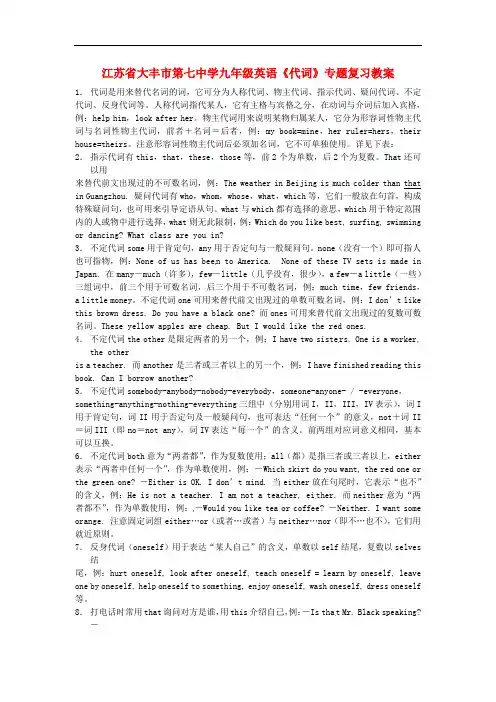
江苏省大丰市第七中学九年级英语《代词》专题复习教案1.代词是用来替代名词的词,它可分为人称代词、物主代词、指示代词、疑问代词、不定代词、反身代词等。
人称代词指代某人,它有主格与宾格之分,在动词与介词后加入宾格,例:help him,look after her。
物主代词用来说明某物归属某人,它分为形容词性物主代词与名词性物主代词,前者+名词=后者,例:my book=mine,her ruler=hers,their house=theirs。
注意形容词性物主代词后必须加名词,它不可单独使用。
详见下表:2.指示代词有this,that,these,those等,前2个为单数,后2个为复数。
That还可以用来替代前文出现过的不可数名词,例:The weather in Beijing is much colder than that in Guangzhou. 疑问代词有who,whom,whose,what,which等,它们一般放在句首,构成特殊疑问句,也可用来引导定语从句。
what与which都有选择的意思,which用于特定范围内的人或物中进行选择,what则无此限制,例:Which do you like best, surfing, swimming or dancing? What class are you in?3.不定代词some用于肯定句,any用于否定句与一般疑问句。
none(没有一个)即可指人也可指物,例:None of us has bee n to America. None of these TV sets is made in Japan. 在many-much(许多),few-little(几乎没有,很少),a few-a little(一些)三组词中,前三个用于可数名词,后三个用于不可数名词,例:much time,few friends,a little money。
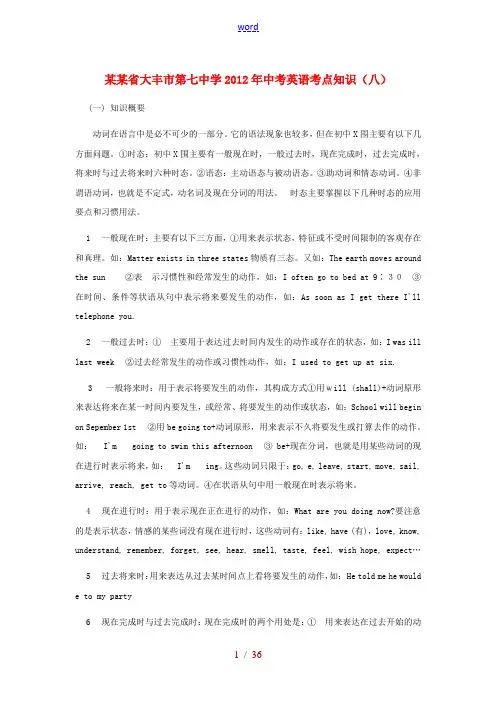
某某省大丰市第七中学2012年中考英语考点知识(八)(一) 知识概要动词在语言中是必不可少的一部分。
它的语法现象也较多,但在初中X围主要有以下几方面问题。
①时态:初中X围主要有一般现在时,一般过去时,现在完成时,过去完成时,将来时与过去将来时六种时态。
②语态:主动语态与被动语态。
③助动词和情态动词。
④非谓语动词,也就是不定式,动名词及现在分词的用法。
时态主要掌握以下几种时态的应用要点和习惯用法。
1一般现在时:主要有以下三方面,①用来表示状态,特征或不受时间限制的客观存在和真理。
如:Matter exists in three states物质有三态。
又如:The earth moves around the sun②表示习惯性和经常发生的动作,如:I often go to bed at 9∶30③在时间、条件等状语从句中表示将来要发生的动作,如:As soon as I get there I'll telephone you.2一般过去时:①主要用于表达过去时间内发生的动作或存在的状态,如:I was ill last week②过去经常发生的动作或习惯性动作,如:I used to get up at six.3一般将来时:用于表示将要发生的动作,其构成方式①用will (shall)+动词原形来表达将来在某一时间内要发生,或经常、将要发生的动作或状态,如:School will begin on Sepember 1st②用be going to+动词原形,用来表示不久将要发生或打算去作的动作。
如:I'm going to swim this afternoon③ be+现在分词,也就是用某些动词的现在进行时表示将来,如:I'm ing。
这些动词只限于:go, e, leave, start, move, sail, arrive, reach, get to等动词。
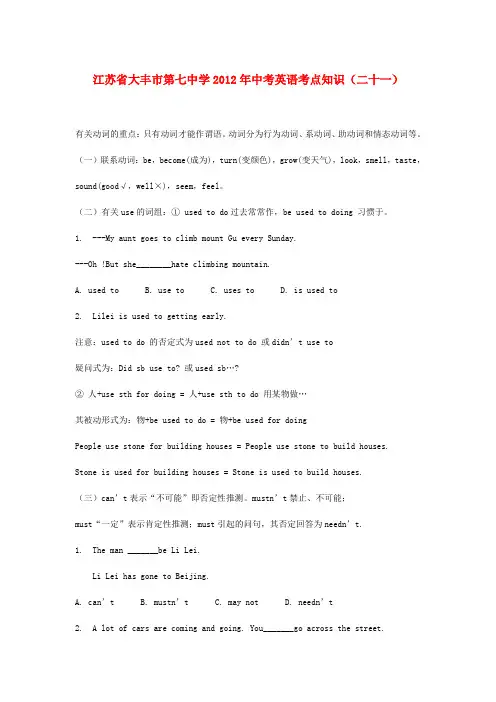
江苏省大丰市第七中学2012年中考英语考点知识(二十一)有关动词的重点:只有动词才能作谓语。
动词分为行为动词、系动词、助动词和情态动词等。
(一)联系动词:be,become(成为),turn(变颜色),grow(变天气),look,smell,taste,sound(good√,well×),seem,feel。
(二)有关use的词组:① used to do过去常常作,be used to doing 习惯于。
1. ---My aunt goes to climb mount Gu every Sunday.---Oh !But she________hate climbing mountain.A. used toB. use toC. uses toD. is used to2. Lilei is used to getting early.注意:used to do 的否定式为used not to do 或didn’t use to疑问式为:Did sb use to? 或used sb…?②人+use sth for doing = 人+use sth to do 用某物做…其被动形式为:物+be used to do = 物+be used for doingPeople use stone for building houses = People use stone to build houses.Stone is used for building houses = Stone is used to build houses.(三)can’t表示“不可能”即否定性推测。
mustn’t禁止、不可能;must“一定”表示肯定性推测;must引起的问句,其否定回答为needn’t.1. The man _______be Li Lei.Li Lei has gone to Beijing.A. can’tB. mustn’tC. may notD. needn’t2. A lot of cars are coming and going. You_______go across the street.A. needn’tB. may notC. mustn’tD. must3. Must I return the book tomorrow morning? No, you_______. You_______keep it for three days.A. mustn’t, mayB. mustn’t, mustC. needn’t, canD. needn’t, may4. ---Look! The man at the gate _______be our headmaster. He is always standing there everymorning. ---No, it be him. He is holding a meeting in the office now.A. must, can’tB. must, mustn’tC. can, can’tD. can, mustn’t (四)及物动词与介词搭配:give, show, pass, lend+物+to+ sb = give(…)sb sth make, sing, buy+物+for+ sb = make(sing, buy)sb sth(五)及物动词+副词结构, 构成的动词短语的宾语是人称代词时,把代词放中间get (it) back,put (it) on,take (it) off,turn (it) on,pick (it) up,try (it) on,look (it) up,wake (me) up,put (it) up.1. Smoking is bad for your health. You’d better_______.A. give up itB. give it upC. take out itD. take it out基础知识:情态动词(一)can:①表能力“能,会”;②表推测“可能”;③表允许“可以”。
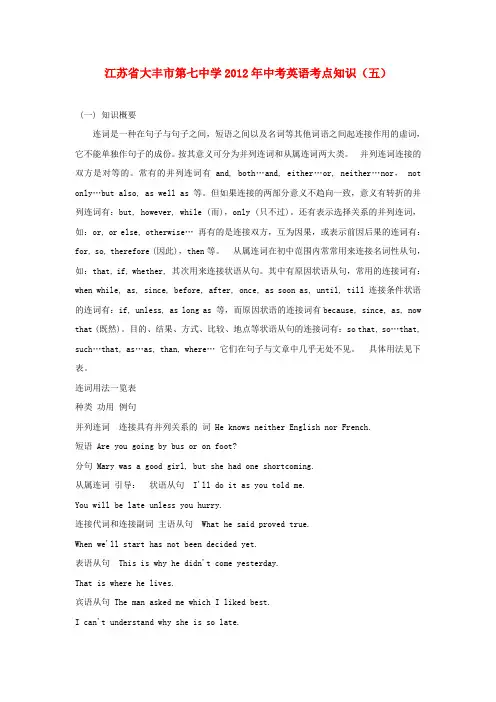
江苏省大丰市第七中学2012年中考英语考点知识(五)(一)连词是一种在句子与句子之间,短语之间以及名词等其他词语之间起连接作用的虚词,双方是对等的。
常有的并列连词有and, both…and, either…or, neither…nor, not only…but also, as well as等。
但如果连接的两部分意义不趋向一致,意义有转折的并列连词有:but, however, while (而),only (只不过)。
还有表示选择关系的并列连词,如:or, or else, otherwise…再有的是连接双方,互为因果,或表示前因后果的连词有:for, so, therefore (因此),then如:that, if, whether, 其次用来连接状语从句。
其中有原因状语从句,常用的连接词有:when while, as, since, before, after, once, as soon as, until, till 连接条件状语的连词有:if, unless, as long as 等,而原因状语的连接词有because, since, as, now that (既然)。
目的、结果、方式、比较、地点等状语从句的连接词有:so that, so…that, such…that, as…as, than, where…连词用法一览表种类功用例句并列连词连接具有并列关系的词 He knows neither English nor French.短语 Are you going by bus or on foot?分句 Mary was a good girl, but she had one shortcoming.从属连词引导:状语从句 I'll do it as you told me.You will be late unless you hurry.连接代词和连接副词主语从句 What he said proved true.When we'll start has not been decided yet.表语从句 This is why he didn't come yesterday.That is where he lives.宾语从句 The man asked me which I liked best.I can't understand why she is so late.关系代词和关系副词定语从句 Nicotine is a drug that gets one into the habit of smoking.He came last night when I was out.(二)[误] Both my parents are not here. They went to the concert just now.[正] Neither of my parents is here. They went to the concert just now.[析]在英语中both一般用于肯定句中,如用于否定句中,其意义也不同于汉语,如:Both of us are not right. 在英语中应被理解为"我们俩不都对。
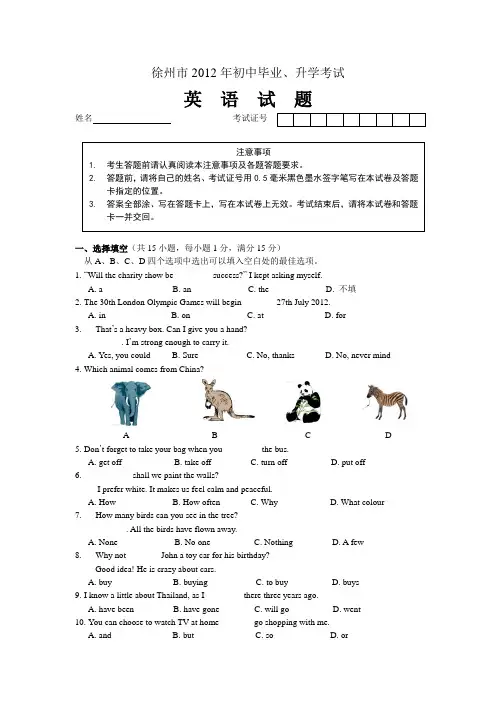
徐州市2012年初中毕业、升学考试英语试题姓名考试证号一、选择填空(共15小题,每小题1分,满分15分)从A、B、C、D四个选项中选出可以填入空白处的最佳选项。
1.“Will the charity show be ________ success?” I kept asking myself.A. aB. anC. theD. 不填2.The 30th London Olympic Games will begin _______ 27th July 2012.A. inB. onC. atD. for3.----That’s a heavy box. Can I give you a hand?----______. I’m strong enough to carry it.A. Yes, you couldB. SureC. No, thanksD. No, never mind4.Which animal comes from China?A B C D5.Don’t forget to take your bag when you ________ the bus.A. get offB. take offC. turn offD. put off6.----________ shall we paint the walls?---- I prefer white. It makes us feel calm and peaceful.A. HowB. How oftenC. WhyD. What colour7.----How many birds can you see in the tree?----_______. All the birds have flown away.A. NoneB. No oneC. NothingD. A few8.----Why not _______ John a toy car for his birthday?----Good idea! He is crazy about cars.A. buyB. buyingC. to buyD. buys9.I know a little about Thailand, as I ________ there three years ago.A. have beenB. have goneC. will goD. went10.You can choose to watch TV at home _______ go shopping with me.A. andB. butC. soD. or11.----Why are you so _______,Amy?----I thought I lost my purse, but I didn’t. I found it in my study!A. angryB. happyC. sadD. nervous12.The room _______ every day. You can live it now.A. cleansB. is cleaningC. is cleanedD. has cleaned13.Which is a traffic sign?A.C.14.----Tom, please tell me____________.----In Sunshine Second School.A. where will the match take placeB. where the match will take placeC. when will the match take placeD. when the match will take place15.----Hurry up, we must be the first to interview the pop star.----Sure.____________.A. East or west, home is the bestB. The early bird catches the wormC. Many hands make light workD. Don’t put all your eggs in one basket二、完形填空(共15小题,每小题1分,满分15分)根据短文内容,从各题所给的A、B、C、D四个选项中选出最佳选项。
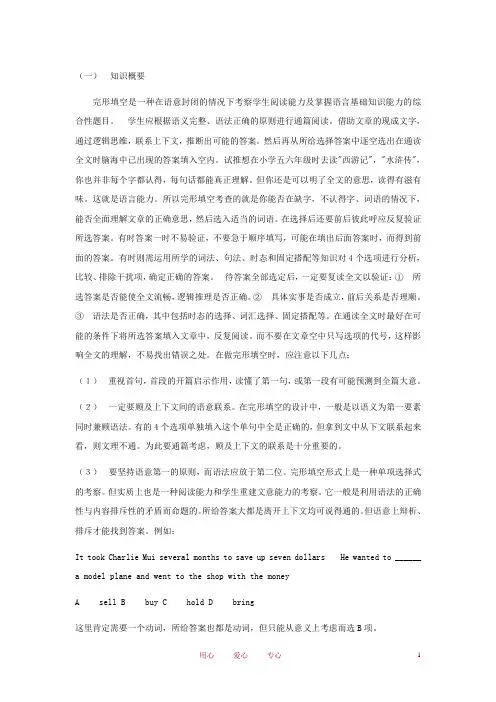
(一)知识概要完形填空是一种在语意封闭的情况下考察学生阅读能力及掌握语言基础知识能力的综合性题目。
学生应根据语义完整、语法正确的原则进行通篇阅读。
借助文章的现成文字,通过逻辑思维,联系上下文,推断出可能的答案。
然后再从所给选择答案中逐空选出在通读全文时脑海中已出现的答案填入空内。
试推想在小学五六年级时去读"西游记","水浒传",你也并非每个字都认得,每句话都能真正理解。
但你还是可以明了全文的意思,读得有滋有味。
这就是语言能力。
所以完形填空考查的就是你能否在缺字,不认得字、词语的情况下,能否全面理解文章的正确意思,然后选入适当的词语。
在选择后还要前后彼此呼应反复验证所选答案。
有时答案一时不易验证,不要急于顺序填写,可能在填出后面答案时,而得到前面的答案。
有时则需运用所学的词法、句法、时态和固定搭配等知识对4个选项进行分析,比较、排除干扰项,确定正确的答案。
待答案全部选定后,一定要复读全文以验证:①所选答案是否能使全文流畅,逻辑推理是否正确。
②具体实事是否成立,前后关系是否理顺。
③语法是否正确,其中包括时态的选择、词汇选择、固定搭配等。
在通读全文时最好在可能的条件下将所选答案填入文章中,反复阅读。
而不要在文章空中只写选项的代号,这样影响全文的理解,不易找出错误之处。
在做完形填空时,应注意以下几点:(1)重视首句,首段的开篇启示作用,读懂了第一句,或第一段有可能预测到全篇大意。
(2)一定要顾及上下文间的语意联系。
在完形填空的设计中,一般是以语义为第一要素同时兼顾语法。
有的4个选项单独填入这个单句中全是正确的,但拿到文中从下文联系起来看,则文理不通。
为此要通篇考虑,顾及上下文的联系是十分重要的。
(3)要坚持语意第一的原则,而语法应放于第二位。
完形填空形式上是一种单项选择式的考察。
但实质上也是一种阅读能力和学生重建文意能力的考察。
它一般是利用语法的正确性与内容排斥性的矛盾而命题的。
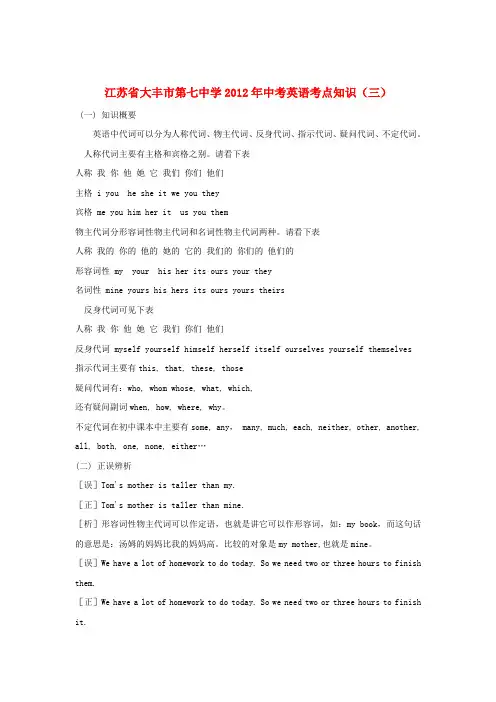
江苏省大丰市第七中学2012年中考英语考点知识(三)(一) 知识概要英语中代词可以分为人称代词、物主代词、反身代词、指示代词、疑问代词、不定代词。
人称我你他她它我们你们他们主格 i you he she it we you they宾格 me you him her it us you them人称我的你的他的她的它的我们的你们的他们的形容词性 my your his her its ours your they名词性 mine yours his hers its ours yours theirs反身代词可见下表人称我你他她它我们你们他们反身代词 myself yourself himself herself itself ourselves yourself themselves 指示代词主要有this, that, these, those疑问代词有:who, whom whose, what, which,还有疑问副词when, how, where, why。
不定代词在初中课本中主要有some, any, many, much, each, neither, other, another, all, both, one, none, either…(二) 正误辨析[误]Tom's mother is taller than my.[正]Tom's mother is taller than mine.[析]形容词性物主代词可以作定语,也就是讲它可以作形容词,如:my book,而这句话的意思是:汤姆的妈妈比我的妈妈高。
比较的对象是my mother,也就是mine。
[误]We have a lot of homework to do today. So we need two or three hours to finish them.[正]We have a lot of homework to do today. So we need two or three hours to finish it.[析]在应用代词时,要注意人称,格与数的一致性。
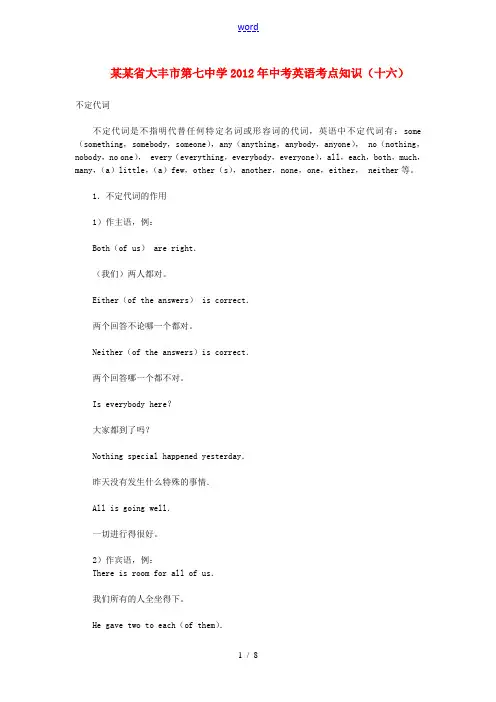
某某省大丰市第七中学2012年中考英语考点知识(十六)不定代词不定代词是不指明代替任何特定名词或形容词的代词,英语中不定代词有:some (something,somebody,someone),any(anything,anybody,anyone), no(nothing,nobody,no one), every(everything,everybody,everyone),all,each,both,much,many,(a)little,(a)few,other(s),another,none,one,either, neither等。
1.不定代词的作用1)作主语,例:Both(of us) are right.(我们)两人都对。
Either(of the answers) is correct.两个回答不论哪一个都对。
Neither(of the answers)is correct.两个回答哪一个都不对。
Is everybody here?大家都到了吗?Nothing special happened yesterday.昨天没有发生什么特殊的事情.All is going well.一切进行得很好。
2)作宾语,例:There is room for all of us.我们所有的人全坐得下。
He gave two to each(of them).他给(他们)每人两个。
I like none of the books.这些书我全不喜欢。
If you have any, give us some.有的话,给我们一点。
3)作表语,例:That’s nothing.没什么。
Is that all you want to know?你想知道的就是这些吗?Thanks, it’s too much for me.谢谢,太多了。
I’m not somebody,I’m nobody.我不是重要人物,我是个无名小卒.That’s really something.那真是一大收获。
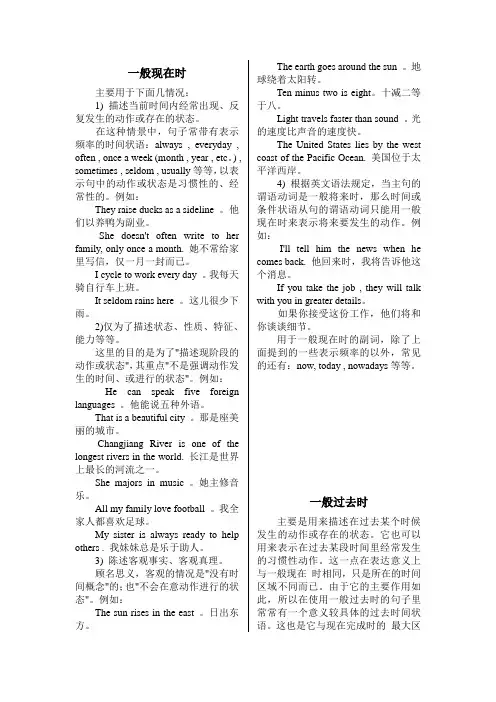
一般现在时主要用于下面几情况:1) 描述当前时间内经常出现、反复发生的动作或存在的状态。
在这种情景中,句子常带有表示频率的时间状语:always , everyday , often , once a week (month , year , etc。
) , sometimes , seldom , usually等等,以表示句中的动作或状态是习惯性的、经常性的。
例如:They raise ducks as a sideline 。
他们以养鸭为副业。
She doesn't often write to her family, only once a month. 她不常给家里写信,仅一月一封而已。
I cycle to work every day 。
我每天骑自行车上班。
It seldom rains here 。
这儿很少下雨。
2)仅为了描述状态、性质、特征、能力等等。
这里的目的是为了"描述现阶段的动作或状态",其重点"不是强调动作发生的时间、或进行的状态"。
例如:He can speak five foreign languages 。
他能说五种外语。
That is a beautiful city 。
那是座美丽的城市。
Changjiang River is one of the longest rivers in the world. 长江是世界上最长的河流之一。
She majors in music 。
她主修音乐。
All my family love football 。
我全家人都喜欢足球。
My sister is always ready to help others . 我妹妹总是乐于助人。
3) 陈述客观事实、客观真理。
顾名思义,客观的情况是"没有时间概念"的;也"不会在意动作进行的状态"。
例如:The sun rises in the east 。
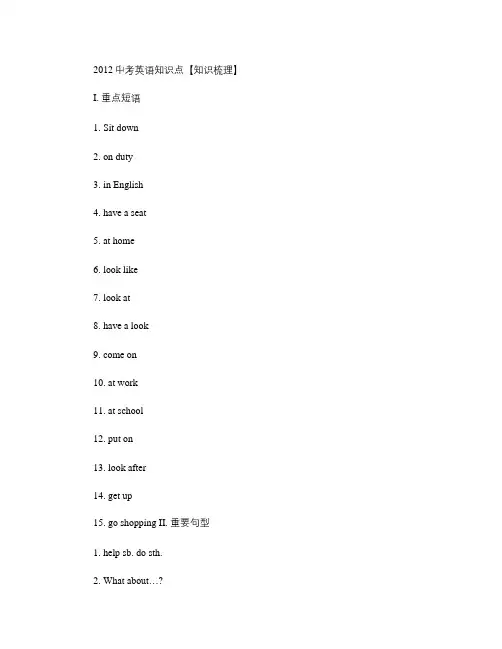
2012中考英语知识点【知识梳理】I. 重点短语1. Sit down2. on duty3. in English4. have a seat5. at home6. look like7. look at8. have a look9. come on10. at work11. at school12. put on13. look after14. get up15. go shopping II. 重要句型1. help sb. do sth.2. What a bout…?3. Let‟s do sth.4. It‟s time to do sth.5. It‟s time for …6. What‟s…? It is…/ It‟s…7. Where is…? It‟s….8. How old are you? I‟m….9. What class are you in? I‟m in….10. Welcome to….11. What‟s …plus…? It‟s….12. I think…13. Who‟s this? This is….14. What can you see?I can see….15. There is (are ….16. What colour is it (are they? It‟s (They‟re…17. Whose …is this? It‟s….18. What time is it? It‟s….7. Goodbye! Bye!8. What‟s your name? My name is ….9. Here you are. This way, please.10. Who‟s o n duty today?11. Let‟s do.12. Let me see.【名师讲解】1. in/on在表示空间位置时,in表示在某个空间的范围以内,on表示在某一个物体的表面之上。
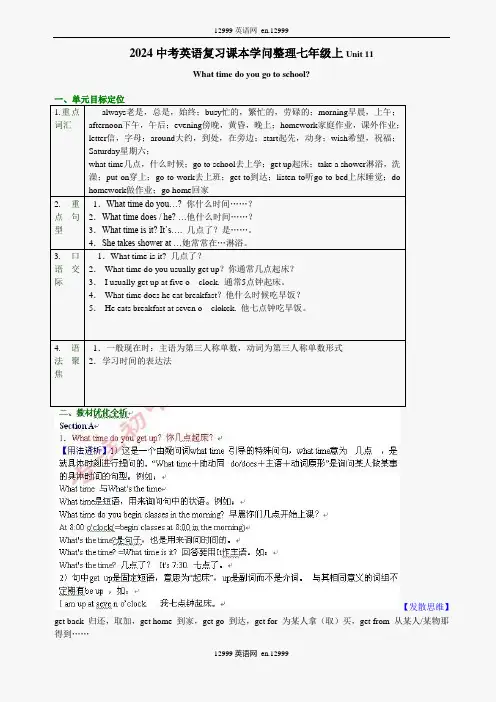
2024中考英语复习课本学问整理七年级上Unit 11What time do you go to school?一、单元目标定位1.重点词汇always老是,总是,始终;busy忙的,繁忙的,劳碌的;morning早晨,上午;afternoon下午,午后;evening傍晚,黄昏,晚上;homework家庭作业,课外作业;letter信,字母;around大约,到处,在旁边;start起先,动身;wish希望,祝福;Saturday星期六;what time几点,什么时候;go to school去上学;get up起床;take a shower淋浴,洗澡;put on穿上;go to work去上班;get to到达;listen to听go to bed上床睡觉;do homework做作业;go home回家2.重点句型1.What time do you…? 你什么时间……?2.What time does / he? …他什么时间……?3.What time is it? It’s…. 几点了?是……。
4.She takes shower at …她常常在…淋浴。
3.口语交际1.What time is it? 几点了?2.-What time do you usually get up?你通常几点起床?3.-I usually get up at five o clock. 通常5点钟起床。
4.-What time does he eat breakfast?他什么时候吃早饭?5.-He eats breakfast at seven o clokck. 他七点钟吃早饭。
4.语法聚焦1.一般现在时:主语为第三人称单数,动词为第三人称单数形式2.学习时间的表达法【发散思维】get back 归还,取加,get home 到家,get go 到达,get for 为某人拿(取)买,get from 从某人/某物那得到……2.I usually get up at five o’clock. 我通常在五点钟起床。
2012中考英语复习(含11真题)七年级(上)Units 7—12要点梳理【词汇拓展】1.help(v.)帮助→helpful(adj.)有帮助的,有用的→helpless(adj.反义词)无帮助的,无用的2.successful(adj.)成功的→success(n.)成功→succeed(u)成功→suecessfully(adv.)成功地3.nine(num.)九→ninth(序数词)第九→nineteenth (序数词)第十九twenty(num.)二十→twentieth(序数词)第二十4.show(n.)演出,表演-,show(v.)展示,给……看5.music(n.)音乐→musician(n.)音乐家,擅长音乐的人6.young(n.)年青的→old(adj.反义词)老的,旧的7.science(n.)科学→scientist(n.)科学家→scientific(adj.)科学的【重点短语】1.at a very good price价格优惠2.on sale廉价出售;出售 3.speech contest演讲比赛4.school trip学校郊游 5.basketball game篮球赛 6.go to a movie去看电影7.1earn abou t学习 8.how much多少 9.Art Festival艺术节10.action movie动作片 11.Chinese history中国历史 12.on weekends在周末13.play the guitar弹吉他 14.join the chess club加入棋类社团 15.play chess 下象棋16.want to do sth.想要做某事 17.be good with sb.与某人相处好18.help…with… 帮助(某人做某事)19.get up起床 20.favorite subject最喜爱的科目21.go to work去上班 22.get to到达 23.go to bed上床睡觉24.go home回家 25.1isten to music听音乐 26.do homework做家庭作业27.tell sb.about sth.告诉某人关于某事 28.a little少量 29.take a shower 洗澡【重点句型】1.-How much is/are…? 某物是多少钱? -It’s/They are… 它/它们是……2.That sounds boring.听起来令人生厌。
2012年中考英语考点20句子的成分和基本句型句子是由各种词类按照一定的语法规则组成的,可以表达完整的概念。
句子开头第一个字母一定要大写,结尾要注明标点符号。
一、句子的成分组成句子的各个部分叫作句子的成分。
句子的成分有主语、谓语、表语、宾语(直接宾语和间接宾语)、宾语补足语、定语和状语。
其中主语和谓语是句子的主体,表语、宾语和宾语补足语是谓语的组成部分,其他成分如定语和状语是句子的次要部分。
1 主语+不及物动词(S+V)主语表示所说的“是什么”或“是谁”,通常用名词、代词、不定式或相当于名词的词、短语或从句担任。
主语要放在句首。
The girl studies in No.4 Middle School.这个女孩子在四中学习。
(叙述“谁”)The post office is open.邮局开门了。
(叙述“事,什么”)Only five are here.只有五个人来了。
(数词作主语)To say is one thing, and to do is another.说是一回事,做是另一回事。
(不定式作主语)What you said hurt me badly.你所说的话深深地刺伤了我。
(从句作主语)注意:it作主语时,可以有以下作用:①表示时间、天气、季节、距离和自然现象。
It's twelve thirty.现在十二点半。
It's windy today.今天刮大风。
It's autumn and they want to go for an out of town tour.这是秋天,他们要去郊游。
It's only ten minutes walk from here.从这儿走十分钟就到了。
It was so hot in this summer.今年夏天可真热!②表示刚刚提到的事情。
What's this? It's a fox.这是什么? 它是一只狐狸。
江苏省大丰市第七中学2012年中考英语考点知识(十一)(一)知识概要由于英语国家的语言习惯与中国的语言习惯有许多不同之处,所以造成了许多同学在做选择或书写,或与人交谈中造成误用中国方式来对英语的问句作解答。
例如一个小女孩十分好看,可爱,外国人见到时会讲: You are so beautiful 这时的答语应该是 Thank you 如果外国人发现你的英语不错,他们会讲: Your English is very good 这时中国人常常会说:不,我说的不好。
这纯是一种礼貌的答语,但是不符合英语习惯。
它正确的答语应是Thank you 虽然交际英语有一些规律可讲,但更重要的是学习外国的生活习惯,了解他们的文化背景,历史渊源,这样才能真正的学好一门外语。
(二)正误辨析[误] - What can I do for you?- Yes, please help me[正] - What can I do for you?- I'd like to buy a sweater[析] What can I do for you? 这一问语实际上用于的情景很多,要根据具体情况而定。
如在商店中售货员讲这句话应译为:您想要点什么?在其他场合也可以被译为:我能为您做些什么?它的答语应是直接讲出想让对方提供的帮助。
[误] - Which colour do you like?- Sorry, I don't like[正] - Which colour do you like?- I prefer blue[析]由 which 来提问的问句是要回答具体的选择,而不能泛指,泛泛的回答。
如 Yes,I like it[误] Do you like to come with us tonight?[正] Would you like to come with us tonight?[析] Do you like …问的是对方的习惯,如: Do you like swimming? Do you like collecting stamps? 而 would you like …则是一次性的邀请、提议。
邀请的英语表达法还有如下几种:Shall we go? 我们走吧!Let's go? 让我们走吧!How about having a cup of tea? 喝杯茶如何?What about a cup of coffee 喝杯咖啡如何?Why not buy it? 为什么不买呢?其肯定答语一般为Certainly, Yes, O.K.All right, With pleasure[误] Sorry, I've kept you waitingNot at all[正] Sorry, I've kept you waitingNever mind[析] "介意不介意"这一问法与答语在中英文中有所不同。
如:- Do you mind my smoking here? - _________A.Yes, do it pleaseB.No, of course notC.Yes, take it pleaseD.No, you can't take it这时正确的选择应是B。
其意为:不介意,当然不。
而A选项则自相矛盾了,它应译为:是的我介意,请抽吧。
而D选项是:不介意,你不能抽。
当向对方争求意见时,可以有以下问法:Do you mind if I open the door?Would you mind mailing the letter for me其答语如果是同意应为: Certainly not, not at all而不同意时应为 Yes,或 I'm sorry[误] What's that man?He is Mike[正] What's that man?He is a teacher[正] Who's that man?He is Mike (He is Mike's father )[析]由 what 提问是问的职业,由 who 提问问的是姓名或身份。
[误] - How much are they?- Half a kilo, please[正] - How many bananas do you want?- Half a kilo Please[析] How much are they? 问的是价格而不是实际物品的多少。
[误] I'm sorry, but is this the way to the park?[正] Excuse me, but is this the way to the park?[析] I'm sorry 是对已经做错了的事向对方道歉时的开始语。
而 Excuse me 是在打扰对方之前表达歉意的话。
[误] - Have a good time tonight!- You are the same[正] - Have a good time tonight!- The same to you[析] The same to you 是表达我也祝您有个愉快的夜晚,它是美语中的习惯用法。
[误] - What's the problem?- I've got a headache[正] What's wrong with you?I've got a headache[析] What's wrong with you? 是询问对方身体状态如何,而 What's the problem?是问对方遇到了什么麻烦。
[误] - Now, I'm back Can I play?- Perhaps You'd better do your homework first[正] - Now, I'm back Can I play?- I'm afraid not You'd better do your homework first[析] Perhaps 是表示对一种拿不准的事态的推论,如: Am I right? Perhaps 而 I'm afraid not 则表达一种不同意的态度。
be afraid 的几种用法有:I'm afraid that you are right其后直接加宾语从句。
- Will you come to my birthday party?- I'm afraid not I have to go to see my father He is in hospital其后+not,表示否定。
- Sorry, I don't want to go there alone, I'm afraid of the dog其后+名词,表示对某人,某物的害怕。
Mary is afraid of making mistakes in the exam其后+ of +动名词,表示害怕做某事。
Mary is afraid to see the teacher because she didn't do well in the exam其后+不定式,表示不敢去做某事。
[误] - How soon will you be ready?- Two days[正] - How soon will you be ready?- In two days[析]此题关键是要根据情景,身临其境,要注意的是对方问了什么,就应答什么。
或答了什么就应问什么。
How soon 问的是"还有多久才能作完",这时要用 in two days,即在两小时之内即可以作完。
如用 How long 提问,则答语可以用 two days。
[误] - Would you mind if I have some time off?- I don't mind- Monday and Tuesday of next week[正] - Would you mind if I have some time off?- When exactly- Monday and Tuesday of next week[析]有的对话是复杂的,稍有不慎就有可能选错,而且英语中如选错了答案是不容易找出错来的。
I don't mind 是可以用来回答 Would you mind…这一提问的,但如仔细看一看则会发现我们要选用的不是陈述句而是疑问句。
根据下面一句的答语来判定要用 when exactly? 什么时间,这样才能与下句中具体的时间相符合。
[误] Suppose your name is Tom The phone rings and you pick it up The first word you say will probably be "Who are you?"[正] Suppose your name is Tom The phone rings and you pick it up The first word you say will probably be "Hello? This is Tom speaking?"[析]在英语学习中,习惯用法实际上在某种情况,或某种意义上讲比语法更为重要。
如果只从句子的角度上去分析,它们可能都是对的。
比如,当你拿起电话时,如果你想知道对方是谁,可以问"Who's that(speaking)?"但不要讲"Who are you?"如果你想先介绍一下自己可以讲"This is ×××× speaking"而不要讲"I'm ××××"也不要讲"My name is ×××××." 就语法而论,"Who are you?" "I'm ×××× ""My name is ××××× "并不错,也是英语中可用的句子,但就打电话这一场合,就不宜用了。